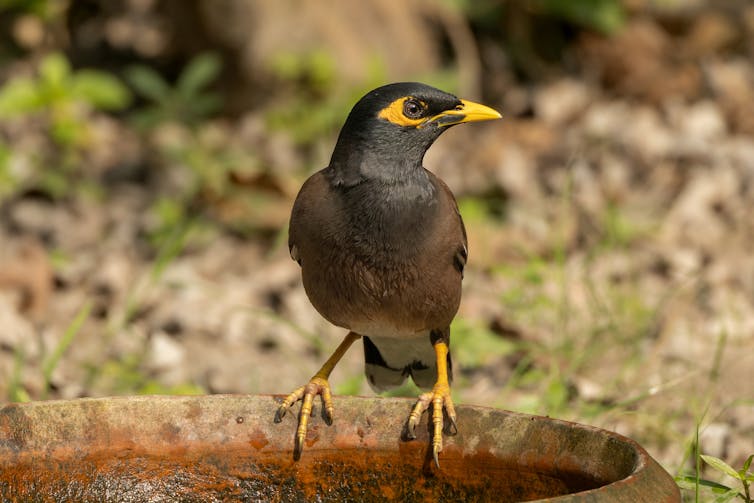We've all had a bad night's sleep, with a snoring partner, a crying baby or neighbours having too much fun. Sleep disturbances are common and have unpleasant consequences the day after, including feeling unmotivated and struggling to communicate.
Author
- Juli Gaviraghi Mussoi
Lecturer in Ecology, University of Waikato
But it turns out we are not alone in this. Our new study reveals birds also suffer when their sleep is disrupted, and it shows in their singing.
Why birds sing
Birds' vocalisations are extraordinarily diverse. They range from simple calls, like a chicken cluck, to complex mimicry of other sounds, sometimes even human voices .
These vocalisations are important for birds to share information about themselves and their surroundings.
Calls are usually short and simple. They are often used for social communication, such as signalling danger or food, for kin recognition or to maintain social bonds.
Songs are more complex and melodious and are used to attract mates, protect a territory or claim a new one.
To produce such sounds, birds must coordinate several body systems, including many parts of the brain, lungs and throat muscles. Because vocalisations are intricate and require precise timing, they are susceptible to errors.
In many species, birds that sing more frequently and with a greater complexity can attract better mates and defend territories. Therefore, a poor-quality song can seriously affect a bird's ability to reproduce and survive.
Sleeping in disturbed environments
Scientists have confirmed that all animals studied so far need sleep. This ranges from jellyfish and worms to whales and birds.
Many animals spend a large proportion of their lives sleeping, with some, such as bats, being reported to sleep up to 20 hours per day.
But sleep quality is increasingly compromised by urbanisation. With ever-expanding cities, disturbances such as light at night, noise pollution and introduced predators are common even in once remote areas. This means many birds live and sleep in highly disturbed environments.
Studies show birds that experience noise and light pollution sleep less, wake up more often and have less intense sleep. Just like for humans, sleep is important for birds for brain development, memory, learning, motivation, stress levels, cognition and communication .

Sleep-deprived birds sing less and rest more
In our research, we focused on common mynas to explore what happens to birds' vocalisations when they don't get enough sleep.
We measured the amount and complexity of their songs and calls after a normal night of sleep versus disturbed nights.
After just one bad night of sleep, common mynas sang fewer and less complex songs. They also spent more time resting during the day. This suggests the birds were less motivated to sing the day after and prioritised napping instead.
In a previous study with Australian magpies, we found a similar result. Magpies sang less and even lost interest in eating their favourite treat after one night of sleep deprivation.
We also tested whether half a night of sleep disturbances (either first or second half) was enough to affect common mynas' vocal behaviour and activity and found that it was. Mynas sang less and rested more after even half a night's disrupted sleep.
Interestingly, birds disturbed in the first half of the night sang less than those disturbed in the second half, though a full night of disruption still had the strongest effect.
Beyond singing, we found their calls also changed. Sleepy common mynas produced longer and lower pitched calls. Since these calls are used for recognition and social communication, the changes could affect how these highly social birds interact.
Why this matters for birds
Our findings reveal that even short-term sleep disturbances can affect how much and how well birds vocalise. But in nature, sleep disruption is rarely a one-off event. Light and noise pollution are chronic issues, present year-round .
This means the quality of birds' songs and calls is likely to be constantly compromised. This raises concerns about the impact urbanisation might be having on bird communication, reproduction and survival.
While common mynas are an invasive species in most parts of the world and are well adapted to urban environments, native species are likely to be less able to cope with sleep disruption driven by urbanisation.
Urban centres can take steps to reduce night disturbances and improve birds' sleep patterns. This includes increasing the number of safer and quieter roosting areas, such as trees and urban parks. It could also mean eliminating unnecessary lighting or using dimmers and downward-facing, warm lights.
Restrictions on heavy or highly modified vehicles and the use of fireworks would lower noise pollution at night to protect natural sleep patterns of the wildlife we share our cities with.
![]()
This study was supported by a student grant from the Australasian Society for the Study of Animal Behaviour and a doctoral scholarship from the University of Auckland.






